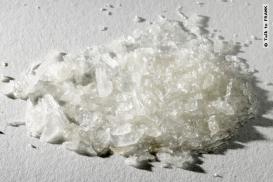Meth Addiction Treatment
Meth is a highly addictive and potent drug that causes similar effects to cocaine. However, meth, in its toxic crystal form, is more powerful and longer acting, wreaking havoc on millions of people around the world.
On the street, meth is a cheap alternative to cocaine and because it can be easily made from common household chemicals, the prevalence of meth across our nation has become an epidemic. With this epidemic, comes a phenomenal rise in people seeking meth addiction treatment.
Effects of Meth

Meth use can cause psychological issues that may lead to suicidal thoughts or actions.
Meth produces euphoria, decreased appetite, and increases in heart rate, blood pressure, respiration, and body temperature. It interferes with multiple neurological functions that can cause serious psychological issues including addiction, paranoia, anxiety, depression, suicidal tendencies, aggression, irrational behaviors, psychosis, and long term impairments to memory and cognitive functions.
According to the Substance Abuse and Mental Health Administration,” The abuse of stimulants is also known to lead to uncharacteristically aberrant or deviant sexual behaviors, the use of prostitutes, and HIV high-risk behaviors.”
Chronic meth abuse deteriorates the person’s physical health and causes sores, infections, low immunity, malnutrition, tooth decay and gum diseases known as meth mouth, thinning of hair, and many other recognizable signs of addiction. Acute effects from excessive doses can cause dangerously rapid and erratic heartbeat, cerebral hemorrhaging, respiratory failure, seizures/convulsions, stroke, coma, and death.
Because of the variability in the poisons used to make meth, it is a neurotoxin capable of damaging the brain and CNS, as well as causing a multitude of other organ impairments.
The Continuous Rise in Meth Addictions
The majority of meth available in the United States comes from super-lab productions, both foreign and domestic, while the rest is made in clandestine and makeshift laboratories of homes.
Although the manufacturing of meth involves the use of highly volatile chemicals that expels dangerous toxins throughout the production process, it doesn’t stop the meth addict from making or using it and they will go to desperate measures to do so. Meth productions in bottles and on stoves make it easier for meth addicts to “cook up” a batch.
Meth Addiction Treatment Options
Treatment options vary by the person, their levels of addiction, patterns of use, physical and mental health conditions, and other contributing factors that would have an impact on treatment effectiveness. Meth addiction alters the brain functionally and structurally posing significant disorders that may require an inpatient stay to ensure a higher degree of safety for the individual. In the least, a partial inpatient stay may be necessary to detox and stabilize physiological conditions.
Outpatient treatment may be preferable for those who are not chronically addicted, have a safe and stable drug free environment with a positive support network at home, no previous relapses, no complicated psychiatric or medical conditions, and a motivation to succeed.
Comprehensive Meth Addiction Treatment
Comprehensive meth addiction treatment involves detox, counseling, behavioral therapies, psychosocial support services, and after care for relapse prevention. According to the National Institute on Drug Abuse, “Addiction treatment must help the individual stop using drugs, maintain a drug-free lifestyle, and achieve productive functioning in the family, at work, and in society.”
Detox
Meth addiction detox treatment involves a safe detox where withdrawal distresses can be minimized in a controlled environment. Meth withdrawals include intense cravings and agonizing symptoms of pain, anxiety, fatigue, and depression. Some individuals experience suicidal or violent tendencies, hallucinations, paranoia, and other psychosis or psychotic behaviors.
According to the National Institute on Drug Abuse, “there are currently no medications that counteract the specific effects of methamphetamine or that prolong abstinence from and reduce the abuse of methamphetamine by an individual addicted to the drug.”
A quality detox will ensure the patient’s comfort and stability under 24 hour observation, providing ready access to medical and psychiatric care when needed. Meth detox treatment programs are equipped to readily provide interventions for unexpected complications along with guidance and support throughout the process from knowledgeable clinicians and counselors.
Counseling
Counseling helps the addict identify and focus on goals and other issues in recovery through the guidance and support of professionals. Family counseling services can help partners, spouses, and loved ones by providing education and support services to mend broken communications and develop coping skills for dealing with the consequences of the addiction.
Group counseling and support is highly advocated to bring in different perspectives, feedback, and support from others undergoing similar circumstances where the participants tend to be more open and honest about their addictions.
Behavioral Therapies
Behavioral therapies are aimed at helping the addict to develop strategies to control meth cravings, identify and avoid “triggers”, cope with stressors, and decrease maladaptive behaviors to remain abstinent and prevent relapse.
Cognitive-behavioral therapy has proven successful for the treatment of meth addictions, helping the person to adjust maladaptive behaviors by changing their thoughts and reactions to them. Contingency management rewards the progress of the addict at various stages or goal accomplishments throughout the
Psychosocial Services
Remaining in treatment for an adequate period of time is crucial and a key part of meth addiction treatment involves education, resources, and encouragement of non-drug related activities and relationships. Linking addicts in treatment to resources for housing, transportation, vocational, educational, self help groups, and after care services can prove vital in helping meth addict remain in recovery, gain independence, and live satisfying lives.
Calls to the general helpline will be answered by a paid advertiser. By calling the helpline you agree to our terms of use.






